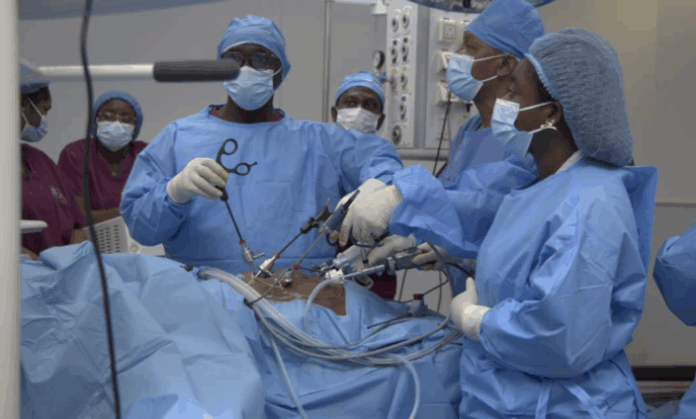The University of Ghana Medical Centre (UGMC) has successfully performed Ghana’s first laparoscopic bariatric surgery, marking a major breakthrough in the country’s medical landscape and efforts to tackle the growing obesity epidemic.
The pioneering procedure, known as a laparoscopic sleeve gastrectomy, involves removing a portion of the stomach to promote weight loss. It was carried out by a multidisciplinary team at UGMC, led by Dr. Kennedy Ondede, Bariatric Surgeon and Head of Surgery at Kenyatta National Hospital in Nairobi, Kenya. The initiative was supported by Medtronic and East Cantonment Pharmacy Limited.
Dr. Ondede explained that the minimally invasive “keyhole” procedure removes about 60–80 per cent of the stomach, reducing food intake while preserving essential nutrients.
“This type of weight-loss surgery is not just about aesthetics; it helps reduce or reverse major obesity-related complications such as hypertension, type 2 diabetes, infertility, and joint issues,” he said.
“Some of our patients who couldn’t conceive now have children. Others no longer require daily medication for chronic diseases.”
The procedure is typically recommended for individuals with a Body Mass Index (BMI) over 30, classified as obese by World Health Organization (WHO) standards. According to Dr. Ondede, patients can lose up to 80 per cent of their excess weight within one to two years post-surgery.
While generally safe, he cautioned that the procedure carries some risks, including infection, staple line leakage, and malnutrition, especially if proper follow-up care is not observed. However, with the right equipment and training, success rates exceed 90 per cent.
He encouraged individuals not opting for surgery to adopt healthier lifestyles—reducing sugar intake, managing their diet, and exercising regularly.
Dr. Dominic Darkwa, a Consultant General Surgeon at UGMC and co-lead of the operation, said the hospital had been planning the introduction of bariatric surgery for over a year.
“We have about 17 to 20 per cent of Ghana’s adult population living with obesity. This puts them at risk for numerous conditions, including heart disease, diabetes, arthritis, and respiratory problems,” he said.
“We planned and trained for this moment, and we’re excited to finally bring this service home.”
He also clarified that the sleeve gastrectomy differs from a gastric bypass. While the sleeve reduces the stomach’s size, a bypass diverts food away from parts of the digestive system to limit nutrient absorption.
“The surgery is only a tool. Patients must follow up with dietitians, psychologists, and exercise routines to meet their health goals. This is just the beginning—we hope to scale up and help many more Ghanaians reclaim their health,” Dr. Darkwa added.
Dr. Baffoe Gyan, Director of Medical Affairs at UGMC, described the successful surgery as a testament to the hospital’s mission of delivering world-class healthcare in Ghana.
“The procedure is very effective—it prevents diseases, reduces drug dependency, and can transform lives,” Dr. Gyan said.
“Bariatric surgery is a procedure many Ghanaians travel abroad to undergo. With the expertise now in Ghana, people no longer need to leave the country for this service.”
Dr. Gyan, also a Cardiothoracic Surgeon, noted that many Ghanaians are genetically predisposed to weight gain and obesity. Bariatric surgery, he said, offers a viable solution for individuals who have not succeeded with traditional weight-loss methods.
The surgery was carried out by a team of more than 30 professionals, including surgeons, anesthetists, perioperative nurses, nutritionists, and equipment providers. Each surgery lasted between two and three hours due to its instructional nature.
Patients typically begin a liquid diet within 24 hours of the surgery and are discharged within three days, with ongoing follow-ups from nutritionists and psychologists considered critical to long-term success.
UGMC is calling on individuals who may benefit from the procedure to enroll in its bariatric programme, which includes a comprehensive pre- and post-surgical support system.
GNA
ALSO READ:



